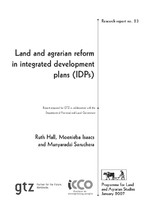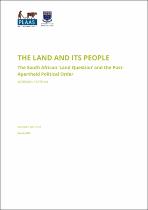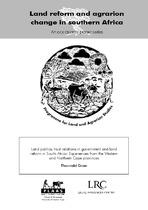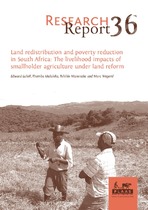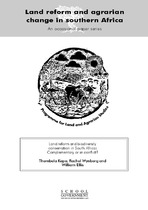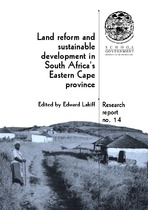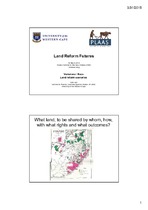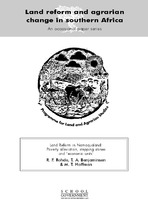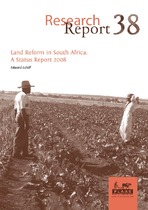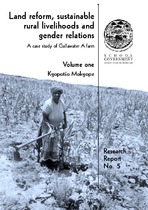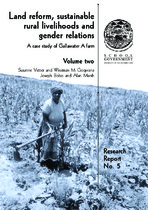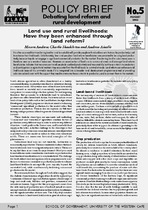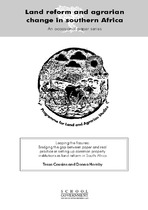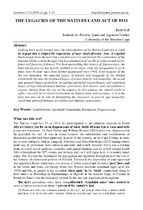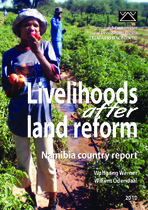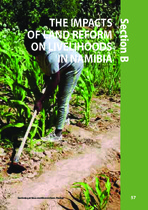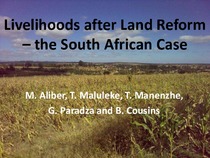Browsing Institute for Poverty, Land and Agrarian Studies (PLAAS) by Subject "Land reform"
Now showing items 41-60 of 99
-
Land and agrarian reform in integrated development plans (IDPs)
(Institute for Poverty, Land and Agrarian Studies, University of the Western Cape, 2007)This research study were conducted in late 2004 and the fi ndings presented to the Department of Provincial and Local Government (DPLG) and shared with the Department of Land Affairs (DLA) in 2005. Since then, some ... -
The Land and Its People: the land question and the South African political order
(Institute for Poverty Land and Agrarian Studies (PLAAS), 2023-03)This paper examines the disjuncture between the discourses of policy deliberation and contentious politics in debates about ‘the land question’ in South Africa. It argues that the South African land debate as it unfolds ... -
Land politics, trust relations in government and land reform in South Africa: Experiences from the Western and Northern Cape provinces
(Institute for Poverty Land and Agrarian Studies (PLAAS), 2006)The land question, as it is posed academically in South Africa, is at the cutting edge of the development debate.1 Should land held by poor peasants, often under some kind of communal tenure, be re-organised as private ... -
Land redistribution and poverty reduction in South Africa: The livelihood impacts of smallholder agriculture under land reform
(Institute for Poverty, Land and Agrarian Studies, University of the Western Cape, 2007)Since its inception in 1994, South Africa’s land reform programme has aimed to achieve multiple objectives, including redressing the historical racial imbalance in landholding, alleviating poverty and developing the ... -
Land reform and biodiversity conservation in South Africa: Complementary or in conflict?
(Institute for Poverty Land and Agrarian Studies (PLAAS), 2003)This paper aims to improve understanding of the conflicts that have arisen between land reform and conservation, and to encourage better comprehension between the land and conservation sectors. It does this by analysing ... -
Land reform and sustainable livelihoods in South Africa's Eastern Cape province
(Institute for Poverty, Land and Agrarian Studies, University of the Western Cape, 2002)The Eastern Cape is one of the nine provinces of South Africa, located in the south-east of the country along the Indian Ocean seaboard. The area was a site of prolonged struggle between native peoples, principally Xh ... -
Land reform futures
(2015)Overarching story • Away from pro-poor neo-liberalism towards the convergence of state resources, private capital and traditional authority • Elite capture of shrinking state resources – dangerous combination in context ... -
Land reform in Namaqualand: Poverty alleviation, stepping stones and economic units
(Institute for Poverty Land and Agrarian Studies (PLAAS), 2001)This paper examines the consequences of land reform for communal livestock farmers in Namaqualand. It investigates the likely outcomes of recent commonage acquisitions and tenure reform in the former ëColoured Reservesí ... -
Land reform in South Africa: A status report 2008
(Institute for Poverty, Land and Agrarian Studies, University of the Western Cape, 2008)After 14 years of democracy in South Africa, there is agreement across the political and social spectrum that the state’s programme of land reform is in severe difficulties. Almost since its inception, the programme ... -
Land reform, sustainable rural livelihoods and gender relations: A case study of Gallawater A farm: Volume 1
(Institute for Poverty, Land and Agrarian Studies, University of the Western Cape, 2000)The research project aimed to investigate the impact of land reform processes on sustainable rural livelihoods and on gender relations in South Africa by examining a case study in the Eastern Cape province. -
Land reform, sustainable rural livelihoods and gender relations: A case study of Gallawater A farm: Volume 2
(Institute for Poverty, Land and Agrarian Studies, University of the Western Cape, 2000)There is an ongoing debate about the sustainability of South African communal rangelands as old views on overgrazing and degradation are being widely challenged. The degradation issue has recently received renewed ... -
Land use and rural livelihoods: Have they been enhanced through land reform?
(Institute for Poverty, Land and Agrarian Studies, University of the Western Cape, 2003)It is often assumed that transferring land to rural households will provide people with valuable assets that can be productively used to enhance their livelihoods. Unfortunately, few rural people or land reform beneficiaries ... -
Leaping the fissures: Bridging the gap between paper and real practice in setting up common property institutions in land reform in South Africa
(Institute for Poverty Land and Agrarian Studies (PLAAS), 2002)New common property institutions (CPIs) were created in South Africa soon after 1994 to enable self-constituted groups of people a choice about how they wished to acquire, hold and manage land. They were to provide rural ... -
The legacies of the Natives Land Act of 1913
(Stellenbosch University, 2014)Looking back at the century since the promulgation of the Natives Land Act, it can be argued that it shaped the trajectories of most South Africans’ lives. It expelled black people from the land into crowded reserves and ... -
Livelihoods after land reform
(Institute for Poverty, Land and Agrarian Studies, University of the Western Cape, 2010)In 1990, Namibia emerged from colonial rule with a skewed distribution of agricultural land and high levels of poverty. The new government led by SWAPO Party initiated a process to address the land question within the ... -
Livelihoods after land reform: Namibia country report (2010)
(Land, Environment and Development Project, Legal Assistance Centre, 2010) -
Livelihoods after land reform: Namibia country report (2010) Section B
(Land, Environment and Development Project, Legal Assistance Centre, 2010)The first AALS farmers in Hardap obtained their land in 1992, and the most recent in 2003. In Omaheke, the first AALS farmer obtained his farm in 1992 and the most recent, a woman, in 2000. Thus in both regions the oldest ... -
Livelihoods after land reform: The impacts of land reform on livelihoods in Namibia: Section B
(Institute for Poverty, Land and Agrarian Studies, University of the Western Cape, 2010)The first AALS farmers in Hardap obtained their land in 1992, and the most recent in 2003. In Omaheke, the first AALS farmer obtained his farm in 1992 and the most recent, a woman, in 2000. Thus in both regions the oldest ... -
Livelihoods after land reform: The South African case
(Institute for Poverty Land and Agrarian Studies (PLAAS), 2012)SA’s land reform regarded as a failure – economic objectives – the spectre of ‘failed projects’ – changing the racial pattern of land ownership – too slow • No consensus as to why, or what to do • Even so, ambitious ... -
Livestock and the rangeland commons in South Africa’s land and agrarian reform
(NISC (Pty) Ltd and Taylor & Francis, 2013)Land and agrarian reform has the potential to expand South Africa’s rangeland commons and enhance their contribution to the livelihoods of the rural poor, yet to a large extent this has been an opportunity missed. ...

